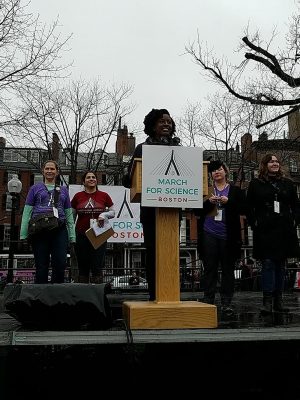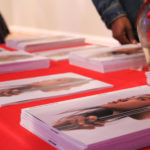
After four months of collaboration, Ashley Ciulla, Elizabeth Crocker and Kim Hokanson, looked out on a crowd of thousands that gathered Saturday on the Boston Common for the March for Science, a march that they spent countless hours organizing.
Drawn together by a passion for science and the internet, Ciulla, Crocker and Hokanson began planning the event together in late January.
“I made the Facebook event page for the Boston March for Science, and Kim Hokanson actually made the group page,” Ciulla said. “We didn’t know each other at the time, and there was no way to merge the pages together … so we actually ended up keeping both pages and combining forces.”
After joining forces, the trio maintained near constant contact, working day and night to bring their vision for a science march to life.
“We basically communicate all day long,” Hokanson said before the march. “Sometimes, all through the night. We get up and start our message thread and say good morning … and we work together all day long, and then we say good night, probably around 11 o’clock.”
All the while, the co-organizers have been balancing their intensive planning with their busy lives.
Ciulla, a research associate at Harvard Medical School, studies biology and genetics. However, much of her personal research has been focused on the environment, driven by a passion for sustainability.
“A big part of it is seeing how much our oceans actually affect everything, from our atmosphere to our on-land ecosystems, and just trying to reduce our human impact,” Ciulla said.
Hokanson has dedicated her time to activism and child welfare, and she is pursuing a doctorate in social work at Boston College.
“Basically, I’ve always felt like I should be doing my part, whatever that is,” Hokanson said, “I should leave the world at least a little bit better than I found it if I can.”
While they might come from a variety of backgrounds, Ciulla, Crocker and Hokanson are all working to ensure a bright future for Boston’s scientific community.
With that vision in mind, the organizers created five main goals for the science community in Boston: communication of scientific knowledge, funding for research, policies guided by evidence-based research, increased science literacy and improving relations with the general public, according to Boston’s March for Science website.
Crocker, a PhD student studying anthropology at Boston University’s College of Arts and Sciences, and Ciulla stressed the importance of the initiative to engage the general public. Ciulla added that science’s potential for inclusivity has roots in the word’s meaning.
“I looked up what the word ‘scientist’ meant, because a lot of people had been asking if only scientists could come to the march,” Ciulla said. “I found out that, in the beginning, the word ‘scientist’ itself was used to replace ‘cultivator of science.’ It really means that anyone who’s passionate about science or grateful for it can be a scientist.”
Crocker said that science can serve as a useful problem-solving tool.
“For me, science is a way of approaching the world that tries to take the chaos of what we’re seeing and experiencing every day and to try to find … solutions that are actionable,” Crocker said.
Even after all the work that has gone into the Saturday march, the organizers haven’t grown tired of each other.
“It’s been absolutely amazing,” Ciulla said, “We didn’t know each other when we first started, and now we spend … from 6 a.m. to 11 p.m. just talking nonstop.”
Hokanson agreed, adding that the group planned to spend time together, even after the march ends.
“I know that we’re going to go out as a group right afterward and turn off our cell phones and just hang out,” Hokanson said. “I think it says a lot that, when it’s over, we’re not going to immediately say goodbye. We’re planning to go out together without the phones.”














